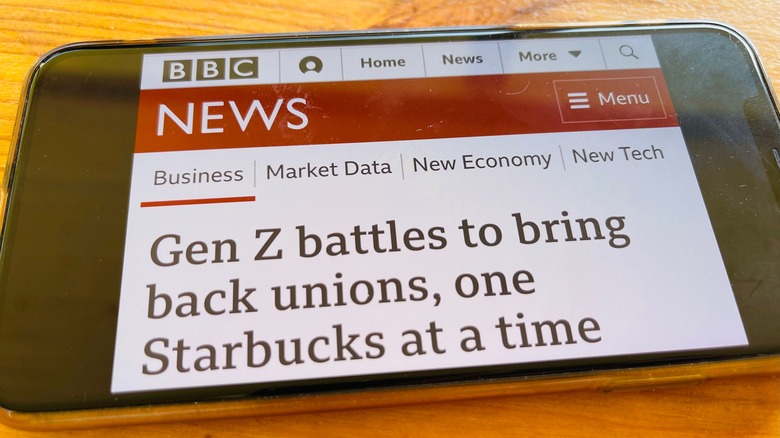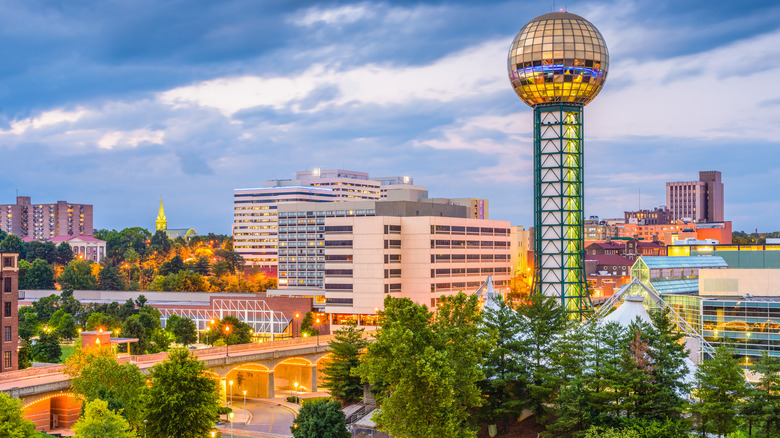The Controversy Surrounding The Starbucks Union Vote In Knoxville
Starbucks first opened in Seattle, Washington in 1971 as a purveyor of coffee made using fresh-roasted beans (via Starbucks' website). Today, the coffee giant known for baristas who misspell customers' names as well as its wide array of caffeine delivery systems is still percolating quite nicely, to say the least. The company's first quarterly earnings release for 2022, dated February 1, reflected nothing but net (and not because it was pumped for March Madness). But it also came with a footnote, by which we mean a fairly standard forward-looking statement disclaimer.
A forward-looking statement disclaimer is what every investor should be looking at before investing in a company because it is here that the company mentions, almost as an afterthought, everything it could reasonably foresee that could harm the company's future financial outlook. "Actual future results and trends may differ materially depending on a variety of factors," Starbucks' Q1 2022 disclaimer reads in part, including "changes in the availability and cost of labor including any union organizing efforts and our responses to such efforts."
So tiny, it's easy to miss, but it's there. And it might speak volumes as to why the controversy surrounding the union vote at a Starbucks in Knoxville, Tennessee on Tuesday, March 29 is so contentious. Let's unpack that, starting with a handy timeline of unionization efforts among Starbucks employees – and Starbucks' efforts to quell them.
Your handy timeline of Starbucks' employees efforts to unionize
Last December, employees of a Starbucks in Buffalo, New York voted to join Workers United, an affiliate of the Service Employees International Union. That required Starbucks to negotiate in good faith with the union on behalf of all the location's employees, regarding the future terms of their employment. On December 20, Starbucks stated its intention to do so, but not without clarifying it does not like dealing with unions (via Letter to Starbucks Partners). Nor without plotting a coup by which CEO Kevin Johnson would be replaced by former Starbucks CEO Howard Schultz. Schultz, who's held the title twice before, has proven a formidable opponent of unions. This swap was made public at the 2021 Annual Shareholders Meeting.
Schultz had his work cut out for him. By March 9, three more Starbucks locations in Buffalo, alone, had voted to join Workers United, per NPR. And this was after a Starbucks in Mesa, Arizona had already voted to do so. By March 22, a Seattle Starbucks had voted to unionize, and six more Seattle stores had filed documents necessary to call for voting (via CNBC). By March 29, another Buffalo and another Mesa location voted in favor, and that same day, a ninth location voted to unionize: the Merchant Road store in Knoxville, Tennessee.
At present, however, this vote is in dispute, and if Starbucks management gets its way, the Knoxville location will become the second to swim against the unionization tide.
Why the Knoxville vote is controversial
On Tuesday, March 29, out of 16 workers at the Starbucks on Merchant Road in Knoxville, Tennessee, eight voted "yes" to joining the Workers United union, versus seven who voted against and one whose ballot has not yet been opened or counted as yet. Maggie Carter, the employee spearheading the location's efforts to unionize, sees the 8-7 vote as a victory. "Despite corporate's aggressive, union-busting tactics throughout this entire campaign, thankfully worker's rights here in Knoxville have prevailed," Maggie Carter stated at a press conference, per Knox News.
Nevertheless, it's too soon to tell which side won because Starbucks has challenged the results. The issue it has raised is whether the 16th vote should be counted and, if so, how. The employee to whom it belongs is an assistant store manager, and in Starbucks' view, that's a management position, which would appear to disallow the employee from voting. If the 16th employee's vote were to be counted as Starbucks would presumably like it to be, then the final vote would be a tie. In the event of a tie, plans for unionizing cannot and will not move forward.
The National Labor Relations Board (NLRB), the federal agency charged with certifying votes of this kind, is expected to hold a hearing in the next 15 days and to make a ruling after that, according to a Workers United spokesperson. Until then, the controversy continues.


